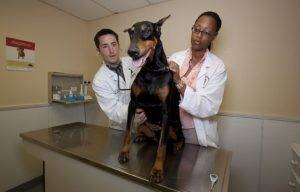 Last month five dogs that were attending dog shows in Georgia and 12 dogs in Florida broke with the Influenza virus. A dog show is a perfect place for an asymptomatic canine influenza-carrying pooch to spread the virus to other dogs. Hundreds of dogs are in close quarters. One dog sneeze projects secretions up to 25 feet. Humans can bring the virus home to their pets. Recently cats in an Indiana shelter with an outbreak of flu in the dogs started to show symptoms and were tested positive for the flu virus. The virus is not contagious to humans at this point in time.
Last month five dogs that were attending dog shows in Georgia and 12 dogs in Florida broke with the Influenza virus. A dog show is a perfect place for an asymptomatic canine influenza-carrying pooch to spread the virus to other dogs. Hundreds of dogs are in close quarters. One dog sneeze projects secretions up to 25 feet. Humans can bring the virus home to their pets. Recently cats in an Indiana shelter with an outbreak of flu in the dogs started to show symptoms and were tested positive for the flu virus. The virus is not contagious to humans at this point in time.
Canine influenza virus infection (CIV) causes a cough. This Type A flu virus is named after the unique amino acid composition of glycoproteins hemagglutinin (H) and neuraminidase (N) on its surface H3N8. The virus was first discovered in 2004 in racing greyhounds. Previously the virus was an equine (horse) virus. The virus changed surface proteins and jumped from horses to dogs. Having observed my dogs and many others in the horse barn devouring horse droppings like fine delicacies I am not too shocked by this occurrence. The newly adapted virus is made up of 8 strands of single strand RNA surrounded by a glycoprotein capsid. It acts by destroying the epithelial cells that are the lining of the lungs.
A large outbreak of canine flu in Chicago in 2015 was discovered to be the H3N2 strain, a whole new CIV that spreads like wildfire in closely quartered dogs. Last year a vaccine was developed for this new strain of flu. In the interest of not over-vaccinating dogs, veterinarians advocated for a combination vaccine. It is now available in a double (bivalent) flu vaccine with the H3N8 strain.
Unlike the human flu, the symptoms are not seasonal. Also in dogs, the virus does not mutate as frequently as in humans so a new vaccine does not have to be created each year. 50-80% of infected dogs exhibit a mild form of canine influenza with symptoms very similar to a kennel cough although many times a cough is a softer moist sounding cough. A cough persists for 10-21 days in spite of antibiotic and cough suppressant administration. In more severely affected dogs a high fever increased respiratory effort, lack of appetite occurred. Recent research has found that severe illness and death were much more likely when the dog was co-infected with CIV and common Streptococcus bacteria. The death rate of dogs showing symptoms is 5%.
The big caveat here is do not ignore a coughing dog. Do not allow your pet to play with coughing dogs. If your dog develops a cough with listlessness and a runny nose see your veterinarian.
The most problematic characteristic of Canine Influenza is that it sheds from the pet before the symptoms appear. So for 4 to 10 days before any signs appear the dog can be spreading the virus to other dogs. Also, 20-50% of the infected dogs show no illness and just spread the virus. What a fantastic way to propagate the virus! And what mayhem it can cause when it is at a boarding, daycare, breeding kennel or shelter. At a large grooming facility or pet store or dog show the virus can be spread by a healthy looking dog that leaves the virus on a surface via a cough, sneeze, drooling or licking. It remains viable on surfaces for 48 hours, clothes for 24 hours and on hands for 12 hours. The owner will never know where the dog got the virus if it was at a groomer or pet store.
How do we prevent the infection? The virus can be removed from the skin by hand washing. All surfaces dogs come in touch with must be cleaned with quaternary ammonium compounds (eg, benzalkonium chloride) and 5% bleach solutions after each and every dog contact. Ask your vet to vaccinate your dog with the CIV vaccine if your dog goes to the Dog Park, groomer, pet store, and boarding or daycare facility. Your boarding facility may require it. The CIV series consists of one vaccine and a booster 2 weeks later. Many of these facilities that are on top of their dog health news are now requiring this vaccine before the dog can enter the facility. The CIV is a lifestyle vaccine so you and your veterinarian can make the decision together about administering the vaccine based on how much contact your dog has with other dogs or places other dogs have frequented.
Your neighborhood vet,








